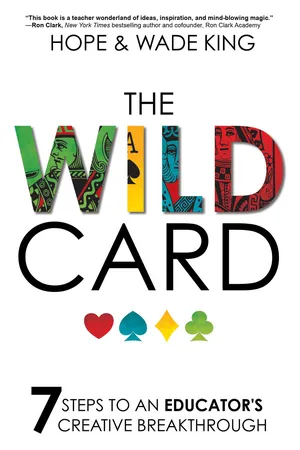
- English
- ePUB (mobile friendly)
- Available on iOS & Android
eBook - ePub
About this book
Have you ever wished you were more creative... or that your students were more engaged in your lessons? The Wild Card is your step-by-step guide to experiencing a creative breakthrough in your classroom with your students. Wade and Hope King show you how to draw on your authentic self to deliver your content creatively and be the wild card who changes the game for your learners.
Frequently asked questions
Yes, you can cancel anytime from the Subscription tab in your account settings on the Perlego website. Your subscription will stay active until the end of your current billing period. Learn how to cancel your subscription.
No, books cannot be downloaded as external files, such as PDFs, for use outside of Perlego. However, you can download books within the Perlego app for offline reading on mobile or tablet. Learn more here.
Perlego offers two plans: Essential and Complete
- Essential is ideal for learners and professionals who enjoy exploring a wide range of subjects. Access the Essential Library with 800,000+ trusted titles and best-sellers across business, personal growth, and the humanities. Includes unlimited reading time and Standard Read Aloud voice.
- Complete: Perfect for advanced learners and researchers needing full, unrestricted access. Unlock 1.4M+ books across hundreds of subjects, including academic and specialized titles. The Complete Plan also includes advanced features like Premium Read Aloud and Research Assistant.
We are an online textbook subscription service, where you can get access to an entire online library for less than the price of a single book per month. With over 1 million books across 1000+ topics, we’ve got you covered! Learn more here.
Look out for the read-aloud symbol on your next book to see if you can listen to it. The read-aloud tool reads text aloud for you, highlighting the text as it is being read. You can pause it, speed it up and slow it down. Learn more here.
Yes! You can use the Perlego app on both iOS or Android devices to read anytime, anywhere — even offline. Perfect for commutes or when you’re on the go.
Please note we cannot support devices running on iOS 13 and Android 7 or earlier. Learn more about using the app.
Please note we cannot support devices running on iOS 13 and Android 7 or earlier. Learn more about using the app.
Yes, you can access The Wild Card by Hope King, Wade King in PDF and/or ePUB format, as well as other popular books in Education & Education General. We have over one million books available in our catalogue for you to explore.
Information
Topic
EducationSubtopic
Education GeneralPART I
Wild Card
The cards always look different when it’s your turn to play them; loaded with subtly different possibilities.
—Alastair Reynolds,
Revelation Space

We’re using the metaphor of a wild card in two different ways here, linking both to teachers and to student engagement. The first, as we said in the Introduction, is the idea that teachers are persons of uncertain influence in their students’ lives. The second is the more slangy use of wild card to describe a person who is unpredictable, full of surprises, or a little bit wacky. And that leads us back to the idea of creativity.
The dictionary defines creativity as the ability to transcend traditional ideas, rules, patterns, or relationships and to create meaningful new ideas, forms, methods, interpretations, etc. We personally believe that every teacher in the world has this ability—including you! You can transcend that standardized curriculum you’re stuck with. You can build more inspired relationships with your students. And you can create meaningful new ways to deliver content. Right this minute, start believing that you have this ability within you! As bestselling author Elizabeth Gilbert puts it, “The universe buries strange jewels within us all and then stands back to see if we can find them.” That’s what your creative breakthrough is all about—tapping into the inner resources you may not have known you had.
Before you start on the steps toward a creative breakthrough in Part II, open your mind to the idea that you really can grow and evolve. You’re probably familiar with the concepts of fixed mindset and growth mindset as they relate to education. People with a fixed mindset believe intelligence is a static trait that was predetermined at birth, while those with a growth mindset believe they can grow their intellect. It’s the same with creativity. You can either tell yourself you were born without it, or you can choose to actively develop it. We urge you to develop a growth mindset regarding your potential for creativity. Before you can have a creative breakthrough, you must have faith it is possible. This section will help you become a believer.
Chapter One
The Game of Life
Each player must accept the cards life deals him or her; but once they are in hand, he or she alone must decide how to play the cards in order to win the game.
—Voltaire

A while back, we read an essay that stuck with us. The author was reflecting on how so much in life depends on the luck of the draw. His idea was that real life is not at all like the game of Monopoly, where all players start on the same square with equal resources and earn another $200 every time they circle back to GO. It’s more like poker, where players receive a randomly dealt hand of cards that may be strong or weak—or somewhere in between, so that anything can happen, depending on luck, strategy, and the cards held by other players. That concept was our starting point for the wild card metaphor.
Think about it: Children don’t have control over their daily lives and the dynamics of “nature” and “nurture” that shape their early experiences. They are dealt a hand that includes their parents—supportive, neglectful, indulgent, or absent—and their socioeconomic status. The luck of the draw determines the neighborhoods they live in and the schools they attend. A roll of the genetic dice shapes the characteristics and personality traits that affect learning: gender, intelligence, attention span, resiliency, self-discipline, and talents.
Very few kids, even those with involved parents and strong socioeconomic resources, have been dealt the real-life equivalent of a full house or a royal flush. Children who are left holding the weakest possible hands—which might include anything from an unstable home environment to a learning disability—don’t have the option to fold their cards and sit out the round until their odds improve. They have no choice but to play the hands they’re dealt. Essentially, childhood is one randomly dealt hand that can influence everything else in life.
WADE: I had a rough childhood. My parents divorced soon after I was born and I never knew my dad. My mom made some bad choices with the men she dated and, as a result, I was horribly abused as a preschooler. People think young children don’t form lasting memories, but I know otherwise because I remember everything that was done to me during those years. Finally, my grandmother and her husband took me into their home. When I was about four, we all traveled to Athens, Greece, a place my grandma had always wanted to see. I can still close my eyes and recall the sights and sounds. I remember the goats grazing on the green hills and the tall columns of the Parthenon. I remember the dense, crusty bread. I loved it there, and it’s the reason ancient civilization is my favorite content to teach today. The fact that I have these memories reinforces for me that memorable experiences—good or bad—really do stick with kids forever.
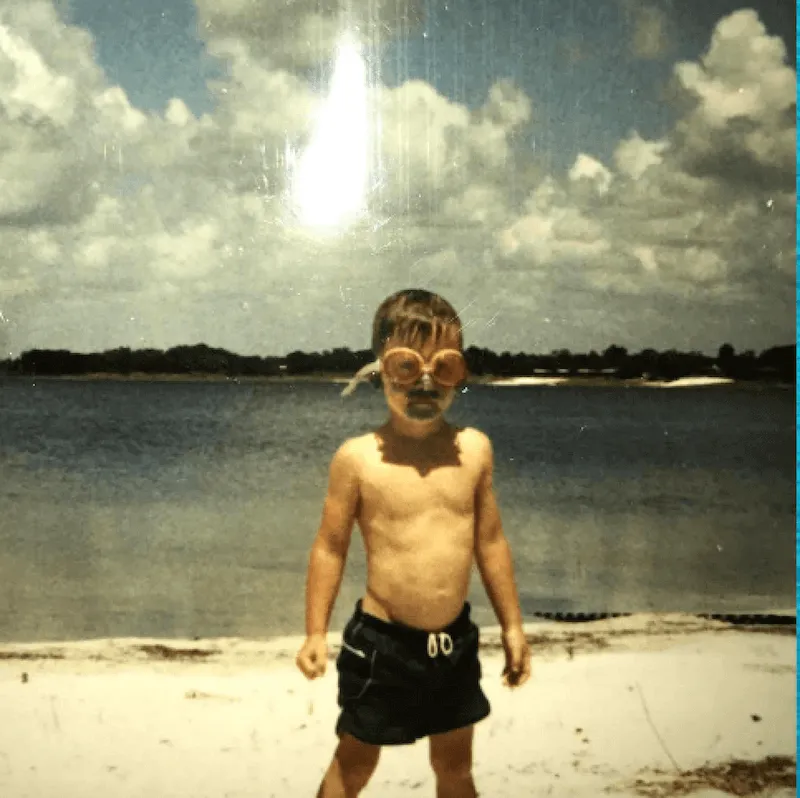
Young Wade at the beach shortly after going to live with his grandmother.
We stayed in Greece for about eleven months. Now, that’s a long time for a vacation, and later it became clear why we had spent so much time there. The trip had been my grandmother’s last wish. She had cancer and died shortly after we returned home. I went to live with an uncle and aunt then. It was my third home and family, and I was only five. For a few years I had a pretty normal childhood, including holidays, family vacations, a cousin who was like a sister to me, and all that good stuff. But that wasn’t meant to be, either.
My aunt and uncle divorced when I was around eleven—old enough to feel heartbroken over losing the family I loved and a stable home environment. I desperately wanted to stay with my aunt and cousin, and I was able to for a year. Then I was shuffled off again to live with my uncle in a condo on the beach. It was a decent home until went through a difficult time. He sold everything our family had owned, and by the time I was in eighth grade I was basically homeless in South Carolina. I resorted to sleeping in the park when my friends’ doors were locked or they weren’t home. When my asthma got bad, I stole inhalers from Revco.
At that point, school was the only consistent thing I’d ever known in my life. I wasn’t a great student, and I didn’t care much about learning. I went to school every day because I didn’t have any place else to go. I needed teachers to push me, and I’m grateful now that they did. I’m grateful I fell into good friendships as well. When I was in tenth grade, a friend invited me to a Bible study group, and that was a turning point. I realized I couldn’t have gotten to where I was without the two constants in my life: teachers and Jesus. I knew I couldn’t become Jesus, so it was then I decided I was going to be a teacher. I was still a struggling student—I think I took algebra three or four times before I passed—but I’d found my purpose in life.
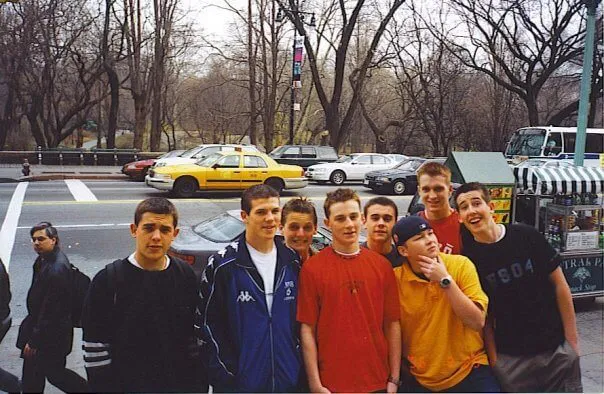
Wade’s friends secretly raised money to pay his way for the class trip to New York City.
HOPE: I have wonderful memories of an idyllic childhood in rural South Carolina. My family was close, and we belonged to a very close-knit church community. My brother and I were practically raised in the church; we were there any time the doors were open. My mom and dad were involved with the youth ministry program, and I loved it when my dad was in charge of locking up the church because it meant I got to stay late and play with my friends.
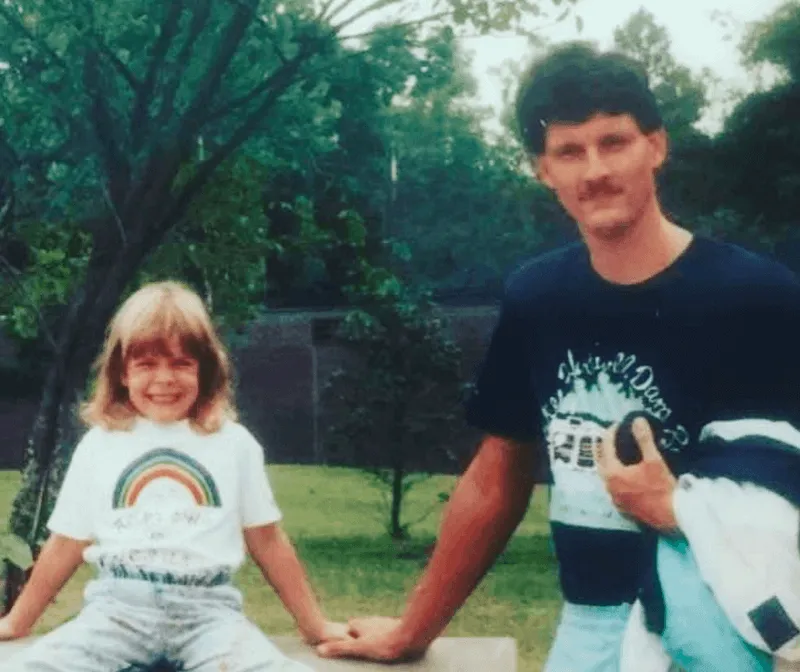
Young Hope and her father, Warren, exploring caves in the Midwest
My mom left an accounting job to stay home with us while we were little. She brought tremendous creativity to everything she did. She taught me all kinds of hands-on crafting skills and even homeschooled me during the years I was in fifth and sixth grade. She was by far the toughest teacher I ever had!
I went to public school from seventh grade on so I could participate in the athletic programs. I had started running races with my dad when I was five years old. In fact, I took first place and received a medal for my very first one-mile race ever. I think that was the beginning of my competitive streak. My dad would ask if I wanted to enter this race or that race, and the first thing out of my mouth would be, “Is there a big trophy?” And I’d usually win. Over the years I ran track, played basketball, and dabbled in just about every sport you can imagine. My dad was always one of the coaches, and he was tough; he made me work really hard. At the time, I was confused as to why he seemed to push me harder than anyone else on the team, but I completely understand it now—he believed in me even more than I believed in myself. He was helping me discover my full potential.
My parents never missed a sporting or school event I participated in. They supported me and shaped me to have a strong backbone. They never made excuses for me or coddled me, so the work ethic came early to me. I was confident enough to go after the things I wanted and to make my own opportunities. I owe a lot to my parents. As a child, you never quite grasp that concept of “you’ll thank me later.” But now? Yep. I get it.
Every child’s metaphorical hand includes one very important wild card—a person whose influence is unpredictable and whose qualities are uncertain. That person is you. As a teacher, you are the wild card. Children who’ve been dealt a strong hand in the game of life might flourish no matter who their teachers are. Others depend on that wild card to change the game. Will you be the teacher who finds a way to inspire, engage, and uplift every child? Or will you fail those children who need you the most by stifling their love of learning and sending them on to an uneasy future? Remember, a wild card can go either way. You can shape either lifelong learners or students who feel like learning is a chore rather than an opportunity.
Creativity Is a Personal Brand
We began our teaching careers in elementary school education in a rural district faced with many challenges. Pendleton Elementary, where we taught, had the lowest test scores in the district. The state intervened and brought us into the South Carolina TAP program (SC TAP), otherwise known as the System for Teacher and Student Advancement. In an effort to standardize the quality of instruction across the state, the school board handed all of us a scripted curriculum for every subject we taught. We had no choice but to follow the script.
Now, it’s easy to see how a scripted lesson could be the enemy of creativity. But let’s imagine a room full of actors auditioning for a part, all reading the same scripted lines out loud. It doesn’t matter if they’re amateur thespians or Hollywood’s finest. The point is, they’ll all draw on their own personal brand of dramatic flair to choose voice inflections, facial expressions, and hand gestures while delivering those lines. Each actor’s audition will be different. Some will shine. Some will deliver lines that fall flat. It’s the same for teachers. You have to decide how you will breathe life into your curriculum, regardless of what it is. If a scripted curriculum is part of the hand you’ve been dealt as a teacher, you’ll need a good game strategy.
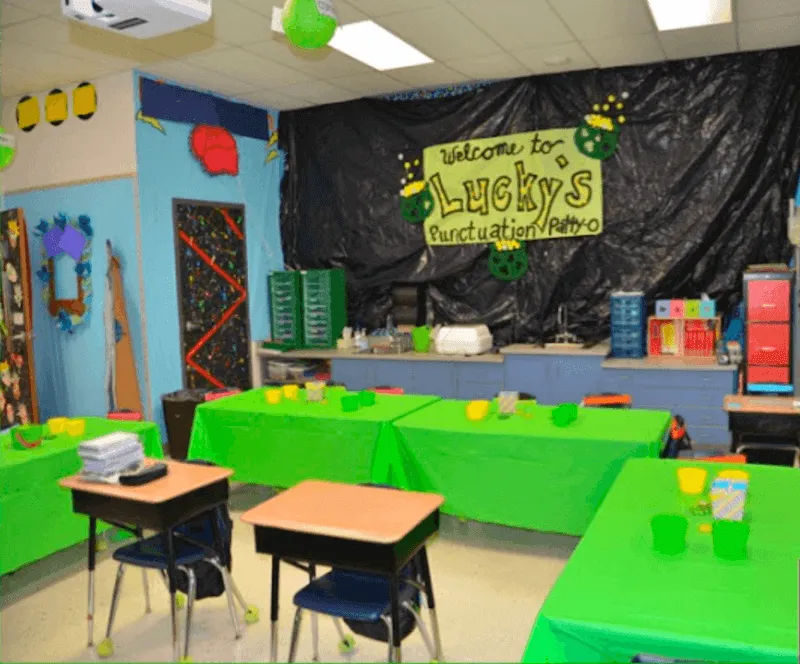
Lucky’s Punctuation Patty-O was one of Hope’s first room transformations.
For us, the strategy was to teach the scripted curriculum as required, but to do it quickly and then take it to the next level—by teaching supplemental material above grade level and including activities that engaged our students. This was when we discovered we could create magic by using our hobbies and interests in the classroom. Wade drew on his athletic background to come up with competitive games that made math more engaging. He brought his electric guitar to school and began writing content-heavy song lyrics that helped kids remember vocabulary and terminology. Hope used her skill at crafting to develop the instructional strategy she eventually became well known for: the room transformation. Her early efforts were quite simple, such as draping green plastic tablecloths over desks and hanging shamrock cutouts on the wall to transport the kids to “Lucky’s Punctuation Patty-O.” The idea was to create an environment that would set the mood for and support the content Hope was teaching. (It worked so well that her room transformations grew more and more elaborate over time, pulling in music, sound effects, props, and even costumes.)
We were just beginning to flex our creative muscle, yet our test scores quickly reflected our efforts. At one point, Wade’s students were testing at the 94th percentile, and the majority (96 percent) of Hope’s students scored as having met or exceeded expectations on the state’s standardized test. Keep in mind that most of our students were struggling when they arrived. Eighty percent of them were testing between the first and thirty-ninth percentile on MAP standardized testing.
In short, our winning strategy was to boost student engagement by delivering our content creatively, despite the scripted curriculum. This can be your strategy too—but you’ll be employing your own personal brand of creativity, not mimicking ours.
Creativity Is a Mindset
In 2009 our administrator at Pendleton Elementary sent every teacher in the school for professional development at the Ron Clark Academy (RCA) in Georgia. In all honesty, we didn’t think, at first, that the teaching techniques at a middle school would cross over into our first- and third-grade classrooms.
Yet something changed for us and for Pendleton Elementary after that trip.
RCA is a vibrant place with a striking décor and high-energy teachers. It’s a place where creativity is encouraged, and educators are given the opportunity to stretch and evolv...
Table of contents
- INTRODUCTION
- PART I: Wild Card
- Chapter One: The Game of Life
- Chapter Two: The Deck Is Not Stacked Against You
- Chapter Three: Don’t Listen to the Joker
- PART II: Creative Breakthrough
- Chapter Four: Awareness
- Chapter Five: Desire
- Chapter Six: Reflection
- Chapter Seven: Engagement
- Chapter Eight: Authenticity
- Chapter Nine: Grit
- Chapter Ten: Persistence
- Chapter Eleven: Snappy Wrap-Up
- PART III: Toolbox
- Works Cited
- Acknowledgments
- More From Dave Burgess Consulting, Inc.
- About the Authors